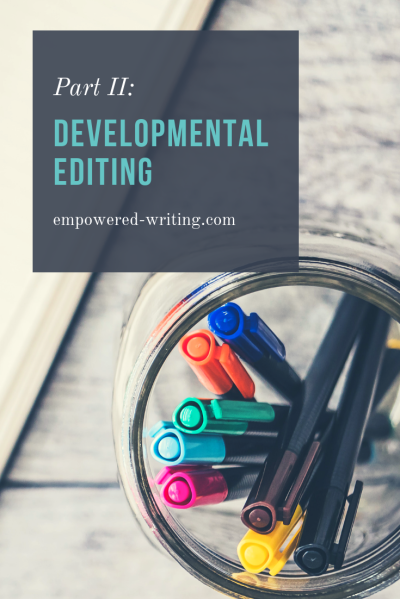 Last week I noted that the first step of successful developmental editing is finding a reader. This week, I’m going to talk about the second step, in which you lay your soul bare and embrace all the feedback the reader gave you.
Last week I noted that the first step of successful developmental editing is finding a reader. This week, I’m going to talk about the second step, in which you lay your soul bare and embrace all the feedback the reader gave you.
This step can be intimidating, but you WILL survive it if you reflect on what you’re trying to achieve with your project, listen to what the reader has to say, and plan your revisions based on what you’ve learned.
First, Write a Project Mission Statement

I, along with many others, love writers’ mission statements. Not only do they ground writers in a clear purpose, but they also create a clear context in which to revise your work. In order to know if you’re achieving your writing goals, you have to know what those goals are to begin with. Knowing what your goals are will help you sort through the feedback you get from readers and decide what is relevant and what is not.
You can begin to articulate your mission statement by answering these questions:
- What’s your purpose?
- What’s your genre?
- Who are your readers?
Once you know the answers to those questions, once you know what YOU are trying to accomplish through your work, you can move on to reading the actual feedback from your readers.
Sorting Through Feedback

One of the biggest issues I see writers encounter is the difficulty of figuring out what feedback to take seriously and what feedback to ignore. There’s just so much of it, and so much of it sounds REALLY GOOD.
But you can’t do it all, and you shouldn’t. The revisions you make based on feedback need to be carefully considered and purposefully chosen. Run all feedback through these questions to figure out what’s a keeper and what’s not:
- Does the feedback address a major issue in the novel?
- Does the feedback make sense in relation to the work’s genre?
- Does the feedback make sense in relation to the work’s audience?
- Does the feedback help you achieve your purpose or
- Does the feedback suggest that you’re not achieving your purpose?
If your answer is “no” to one or more of these questions for the given revision suggestion, then you can pretty safely ignore it. In general, if the feedback fails to “get” your audience or genre, it might not be useful.
For example, if you’re writing a kid’s book and the feedback is, “this book needs more sex,” that may not be appropriate feedback for the genre or for the audience of your work. Ignore it. 🙂
Make a Revision List

This list will guide your developmental edits, keeping you on track and keeping your story expanding and growing purposefully.
I recommend you order the items in your list from most important revision to least important revision. It might look something like this:
- Protagonist is unsympathetic, and I want her to be sympathetic. Add scenes at beginning to increase her likability
- Plot hole in second half of novel: fix
- Opening scene is boring. Start in new place
- Dialogue could be quicker in places
An unsympathetic protagonist is a major problem that impacts the quality of the entire novel; it gets top billing and your most focused attention during developmental editing.
Plot holes are never good, but this one only affects the final third of the novel, so it goes after your protagonist problems.
The opening scene and bad dialogue are definitely concerns, but they may not affect the structure or plot of the novel as a whole, so they can be done last.
When you prioritize your revisions this way, you’ll be organized and on track to finish a polished draft of your book!
Hang on to your hats, guys, because next week I’ll talk about the role of research during the developmental writing stage. Fun times!

Looking for the best reader feedback possible? Want feedback that is purposeful and focused on your goals and concerns? Then try giving your reader a writer’s memo along with your manuscript. Never written one before? No worries! Here’s my free guide on creating the perfect writer’s memo. Happy holidays!
Writers, how do you guys decide what reader feedback to keep and what to discard?


2 thoughts on “Developmental Editing: Reflect, Listen, and Plan to Give Your Work New Life”